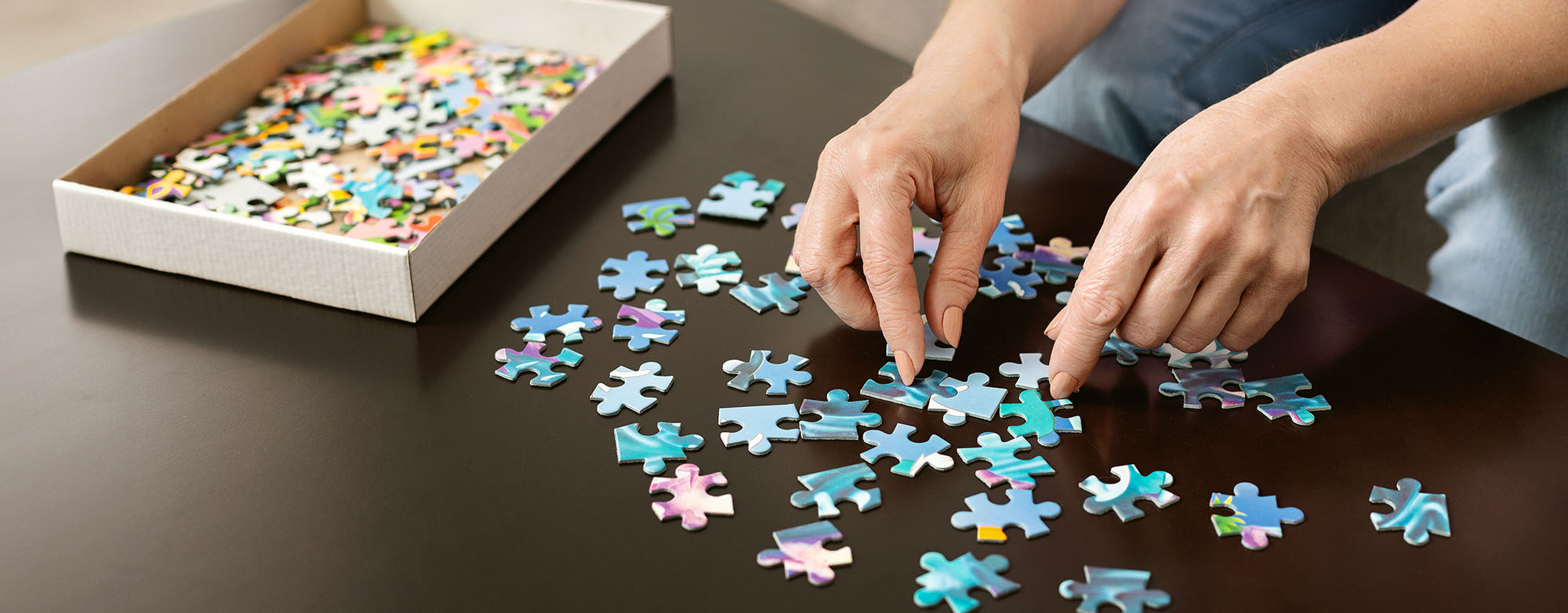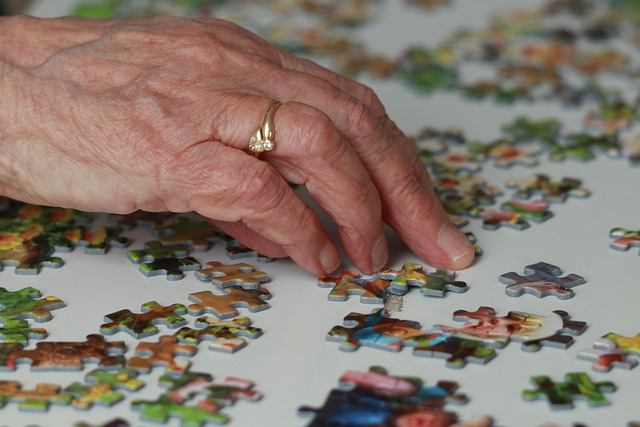
There is something about puzzles that challenges the mind and keep us engaged—all important benefits for seniors. Puzzles require focus, which allows you to relax your mind. And studies have shown that puzzles increase short-term memory and problem-solving skills. Perhaps the most surprising news of all is that puzzles both improve brain health and reduce cognitive decline. Watch this video as a neurology expert explains how puzzles benefit the brain.
Here are 8 benefits of puzzles for seniors
Improved short-term memory
Working on a puzzle reinforces connections between brain cells. Jigsaw puzzles in particular use the area of the brain that stores memories. Remembering puzzle shapes, colors, and pieces strengthens short-term memory. Strengthening and exercising short-term memory is especially important for older adults who live on their own, live in retirement communities or are memory care residents.
Right and left sides of brain
Both sides of the brain work together to solve even the simplest of puzzles. For crosswords, sudoku and jigsaw puzzles, the critical thinking left brain, and the creative, problem-solving right brain work in tandem. Exercising and keeping the brain engaged helps keeps seniors’ minds sharp.
Social collaboration
Puzzles are one of the few types of games that can be played alone or with others. But like most things, puzzles are more fun when working collaboratively. When you live in a community like Wesley, working with friends to solve a problem and achieve a common goal brings a feeling of satisfaction and shared accomplishment. Social interactions are an important way for seniors to remain active and engaged.
Enhanced problem-solving skills
Merriam Webster defines a puzzle as “a game or test that is designed to be challenging to answer or solve.” Crossword puzzles, riddles, word searches, and logic problems activate different parts of the brain, which hones critical and analytical thinking skills.
Crossword, jigsaw and sudoku puzzles enhance your problem-solving abilities as words, pieces and numbers must be worked and reworked to reach the solution. A study by the University of Exeter and King’s College London has proven that seniors who do crossword and word puzzles have a brain function equivalent to that of a person ten years younger.
Fun Fact: The first jigsaw puzzle was created in 1760 by a cartographer who glued a map to a flat piece of wood and cut it into pieces as a teaching tool.
Mood enhancement and lower stress
Solving puzzles results in a sense of satisfaction which causes the release of dopamine. As you know, dopamine regulates mood and feelings of optimism. It also enhances memory, concentration and motivation. That’s why puzzles can be addictive (in a good way)! Plus, challenging the brain to successfully solve problems is gratifying.
Visual-spatial reasoning
Jigsaw puzzles, with their different shapes and colors require you to understand where they fit within a larger image. This improves visual-spatial reasoning, which helps keep your mind sharp.
Delay in dementia and Alzheimer’s symptoms
A study published in the JAMA found that the more frequently adults participated in active mental activities, the greater the reduction in dementia and Alzheimer’s risk. Working on crosswords or other puzzles, and even playing games and cards sharpens your mental and cognitive acuity. Puzzles are good for the brain.
For seniors who already have mild cognitive decline and who live in memory care, jigsaw puzzles still yield many of the benefits mentioned. There are puzzles for everyone, and even puzzles made especially for those with dementia and Alzheimer’s which have larger and fewer pieces.
Improved dexterity
For people with arthritis or for stroke patients, picking up puzzle pieces and fitting them into place is a challenge that exercises the small muscles in the fingers. Using these muscles regularly improves manual dexterity. Wesley communities offer a full spectrum of options for aging well in the Puget Sound area. From mind-stimulating classes to overnight excursions, each Wesley community’s calendar of events keeps you active and engaged. Visit our communities in Washington State in Des Moines, Auburn, Puyallup, or Bonney Lake.
